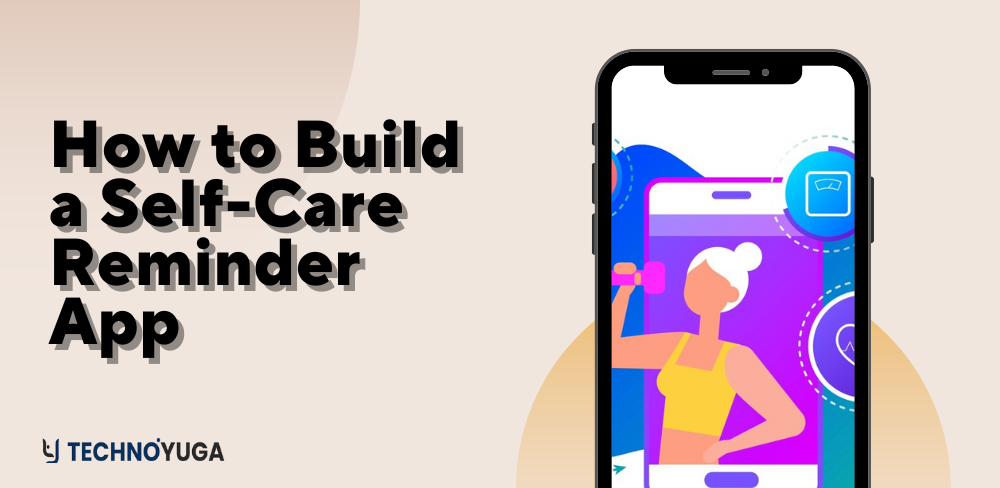It’s hard to become better these days in a society full of instability, hard lives, and bad daily habits. Thus, apps that serve as reminders for self-care have emerged. The purpose of these reminder apps is to guarantee a healthy lifestyle for both body and mind of its users.
Making sure people take the time to care for themselves can be greatly contributed by the use of a self-care reminder app. This blog will discuss various aspects of self-care reminder app development such as benefits and features. Also we will cover how to build self-care reminder app along with the factors influencing the mobile app development cost.
What is a Self-Care Reminder App?
The practice of forming habits to guarantee one’s overall wellbeing, improve health, and actively tackle disease when it arises is known as self-care. Self-care reminder apps are intended to provide you the ability to take initiative. One of the main objectives of these apps is to improve your general state of wellness by addressing not only your physical and mental health but also your social health.
Are you prepared to enter the world of self-care reminder mobile app development? Let’s begin with an overview of the benefits and essential features of self-care reminder app development in the coming sections.
Benefits of a Self-Care Reminder App
-
Encourages Self-Care
Consistent reminders help people remember self-care which encourages routines to improve overall wellness.
-
Increases Productivity
Taking good care of the body and mind can help one become more focused and productive when doing everyday chores.
-
Convenience
Keeping self-care resources on your phone makes them readily available. You can track your mood and practice guided meditation with ease.
-
Customization
You can change features of your app to meet your specific needs. For instance, push notification can help users in remembering to prioritize their own well-being.
-
Reduces anxiety
By encouraging activities like exercise and meditation the app can help reduce anxiety and stress.
Essential Features of a Self-Care Reminder App
-
Customized Reminders
Provide users the option to create personalized reminders for different types of self-care tasks.
-
Activity Tracking
Monitor development and offer guidance on self-care practices.
-
Goal Defining
Assist users in establishing and accomplishing their own wellness goals.
-
Motivational Quotes and Advice
Offer helpful self-care advice along with daily motivation.
-
Cross-platform Integration
For an advanced approach you can synchronize the fitness app with calendars, fitness trackers, and other health-care apps.
-
User-friendly Interface
Designed to be simple and effortless to use, with a layout that is intuitive.
-
Push notifications
They are used to notify users of upcoming planned activities.
6 Steps to Build Self-Care Reminder App
Following are some necessary steps to build Self-care reminder app that you need to follow for the success of your app and for the well being of the users:
1. Concept Creation and Market Analysis
-
- To determine the requirements and preferences of the target audience, conduct research, questionnaires and interviews.
- Examine current apps to find areas for improvement and chances for creativity.
- Determine what will set your app apart from other apps in the competitive market by defining the USP.
2. UI/UX Design
-
- Draw wireframes to show the organization and flow of the application.
- Create a simple and aesthetically pleasing user interface that attracts the users.
- Create a prototype for assessing the ease of use and functionality of the app.
3. Selection of Technology Stack
-
- Front-end development: For a smooth cross-platform experience, use frameworks like Flutter or React Native.
- Back-end development: To manage users and store data, go with dependable back-end frameworks like Django or Node.js.
- Choose databases like Firebase or PostgreSQL when considering the scalability.
4. Developmental Phase
-
- Create essential functions including goal-setting, activity monitoring, and customized reminders.
- Make sure that third-party programs and devices integrate seamlessly.
- To find and address flaws and guarantee a positive user experience, carry out thorough testing.
5. Testing and Quality Control
-
- Beta testing: Provide a prerelease version to a limited user base in order to collect input and make required enhancements.
- Performance testing: Verify that the application operates smoothly on a range of devices and in a variety of environments.
- Security testing: Put security measures in place to safeguard user information and privacy.
6. Launch and Promotion
-
- Pre-Launch Marketing: Use blogs, social media and other platforms to create a presence in the mind of the audience.
- App Store Optimization (ASO): To boost exposure and downloads, optimize the app’s placement in app stores.
- Updates and User input: To make the app better, provide updates and continuously collect user input.
Factors Affecting the Self-Care Reminder App Development Cost
-
Scope and Complexity
Self-Care Reminder App Development Cost is directly impacted by the quantity and complexity of features. Expenses will rise for advanced services like AI-driven suggestions.
-
Platforms
Developing for both iOS and Android will be more expensive than concentrating on just one platform.
-
Design Quality
Custom, high-caliber UI/UX designs can increase the Self-Care Reminder App Development Cost, but they also increase customer satisfaction.
-
Development Team
Depending on the team’s size and level of experience, costs vary. To hire dedicated developers from outside might sometimes be less expensive than recruiting internal ones.
-
Technology Stack
Self-Care Reminder App Development Cost are influenced by the technologies selected. Technologies that are well-liked and supported can save costs.
-
Updating and Maintenance
It’s important to account for ongoing expenses related to bug patches, feature updates, and maintenance.
The above factors have a direct influence on the Self-Care Reminder App Development Cost. It is advised to consult with a reputed mobile app development company to keep the development under budget.
Conclusion
To build self-care reminder app is complex and calls for smart execution, careful planning and thoughtful design. Through knowledge of the necessary functionalities, advantages, and steps involved, you can build self-care reminder app that efficiently encourages self-care and improves the wellbeing of its users.
You can guarantee that you budget effectively and optimize the app’s performance by taking into factors that impact the Self-Care Reminder App Development Cost. Your Self-Care Reminder App has the potential to significantly improve users’ lives if you approach it with the correct mindset and commitment.








